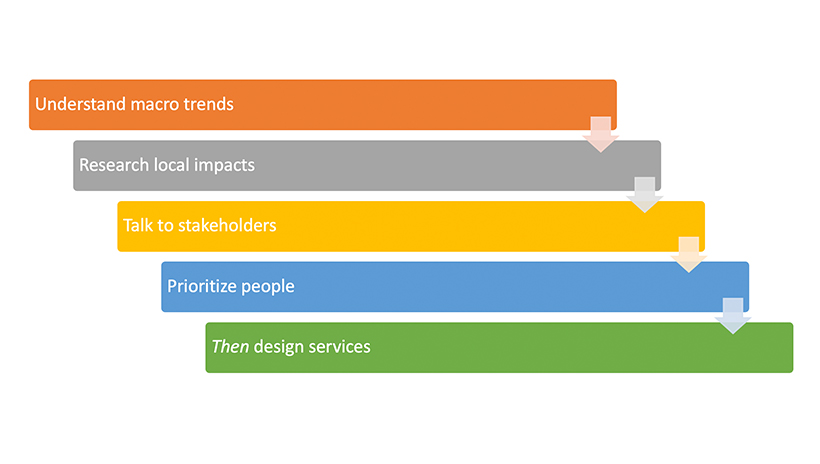Automation. COVID. The Great Recession. Every few years, something seems to come along and dramatically shift the career and job landscape for our communities. In a rapidly changing globalized world, the needs of job seekers will continue to evolve, too. How can a library’s programs and services possibly keep up?
We can reset our job and career services for resilient equity by building a long-term vision with people at the core. Our goal isn’t just to provide the right program today. It’s economic empowerment: a community where all people have an equitable opportunity to achieve their own definition of career success. This vision requires support at individual, environmental, and systemic levels. At an individual level, libraries can aspire to help all people reach their own unique career goals. At the environmental level, we can envision a world where everyone has the support they need to adapt and be resilient in the face of changing circumstances. At a systems level, we can strive to recognize and address inequitable economic systems, simultaneously helping people navigate what exists now while working for what should be.
To align our job and career programs with this vision of economic empowerment, we need to start with the community—not the library. I’ll walk you through a process you can use to help do this in an effective and authentic way. In short, you can transform your job and career programs by empowering the community to shape them directly. When the goals and needs of local job seekers drive your programs, your topics and methods will shift naturally to meet demand. Your library already likely thinks about community needs as a basis for decisions. I’m asking you to take it a few steps further—to actually give power over to the community to create its own programs.
In short, you can transform your job and career programs by empowering the community to shape them directly. When the goals and needs of local job seekers drive your programs, your topics and methods will shift naturally to meet demand. Your library already likely thinks about community needs as a basis for decisions. I’m asking you to take it a few steps further—to actually give power over to the community to create its own programs.
Table of Contents
Macro Trends
Not sure where to start? You can begin by looking at major trends impacting the economy. These are usually bigger than your community itself—think of disruptive technologies, national recessions, or major shifts in public opinion or policy. Do some research and gather data to deepen your understanding of this issue.
Local Impact
Next, learn more about how this trend affects your community locally. Don’t assume—go look for evidence. It’s likely that your community produces more data than you realize. Your municipality probably has a comprehensive plan. Regional nonprofits or economic development coalitions may have released white papers on key career-related issues in your area. Even places with few local resources are likely served by some state and federal agencies focused on workforce or economic development. Look for their annual reports or work plans.
Listen Up
Once you understand the larger trend and its local impacts, you’re ready to start talking to people. Your research gives you the context to ask meaningful questions, and the perspective to glean real insight from the answers. Doing this pre-work shows respect for people’s time and expertise.
Who should you try to reach for a conversation? The people who are most impacted by the issue you’re exploring. You researched the lay of the land, so you have a sense of who is highly or disproportionately affected. Try to disaggregate this as much as possible; broad statistics about the whole community can hide disparities between different industries, geographies, demographics, etc. Identify stakeholders from impacted groups and reach out.
You may not have pre-existing connections with all the key stakeholders you’ve identified. Reach out anyway. I promise, cold calling isn’t as bad as you imagine. It can even be fun! I’ve reached out to hundreds of potential partners (in other words, total strangers) during my career. People are kind and warm almost without fail, even when the answer is “no.” They love the library and are pleased that you thought of them.
When you have a conversation with a community stakeholder, it’s important not to focus on the library. Instead, ask them about their aspirations and goals. What economic issues are they passionate about? What exciting work are they doing? What resources or support would they need to be wildly successful? This will give you a rich picture while building a relationship.
Prioritize
Once you’ve heard from a range of folks in your community about their aspirations, you can start thinking about the role of library services in achieving them. Determine what populations and goals you will prioritize. We can’t do it all, and certainly not all at once. Where do the goals and resources of the community best intersect with those of the library? Where do you have an opportunity to contribute in the most meaningful ways?
Note that I asked which people you will prioritize, not which types of programs. A programmatic response may work in the short term, but, when community goals and needs evolve, the type of program you selected may no longer be relevant. Instead, focus on an audience. Get to know them deeply. Stay in a relationship with them. When their goals change, so will your job and career services.
Tools
There are several tools you can use to help you clearly define and understand your priority audiences. Two of my favorites are personas and Lean Canvas.
A persona is an example individual from your priority audience. Give them a name and a face. Write a one-page synopsis of that person’s background, goals, relevant likes and dislikes, etc. If you’ve ever made a Dungeons & Dragons character sheet, you have the general idea. When you’re planning a program, a persona can help you think concretely about how it would serve a particular person (Jane), rather than an abstract population (job seekers). There are lots of templates out there, so find one that works for you.
Lean Canvas is a business planning tool. It’s designed for startups as a one-page overview of their business model. Since we’re developing business and career programs, I find it informative to use a tool with a built-in business perspective. You’ll briefly describe your audience (bonus points if you’ve already created a persona for them!), then think through their specific goals and challenges, what the library can uniquely offer to them, and how to define and measure success. I like the explanation in this video by Lean Canvas creator Ash Maurya.
Co-Create
Now, finally, you can start designing job and career programs. I know, it’s been a long road! But the up-front investment is so worth it. Because of all the learning and relationship-building you’ve done, your programs will be fundamentally different. You’ll know that they are directly helping the community achieve its own goals. Remember that you can’t do that alone. It’s essential to co-create these programs with your community stakeholders and partners.
Your community doesn’t need you to tell them how to reach their goals or resolve their barriers. They already know. And they’re already doing brilliant work to get there. The library’s role is to provide them with equitable access to resources and support. The community provides the goals, the definition of success, and the culturally relevant activities to reach it. Give them the power to make these decisions. You can offer space, expert staff, a robust network, program planning know-how, a mechanism for promoting events, and deep expertise in curating information. (Want an example of how this can look? Read about a community-led Latinx entrepreneurship festival here.) When you co-design, the resulting programs can be successful in ways you might never have imagined alone.
You can reset your job and career programs by adopting a goal of long-term economic empowerment. Put your community at the center. Learn and listen. Determine where you can best contribute to community goals. Then give power over to your partners to co-create that reality. The result is a local economy that is more empowered, more equitable, and more resilient: an economy for all.
See also:




